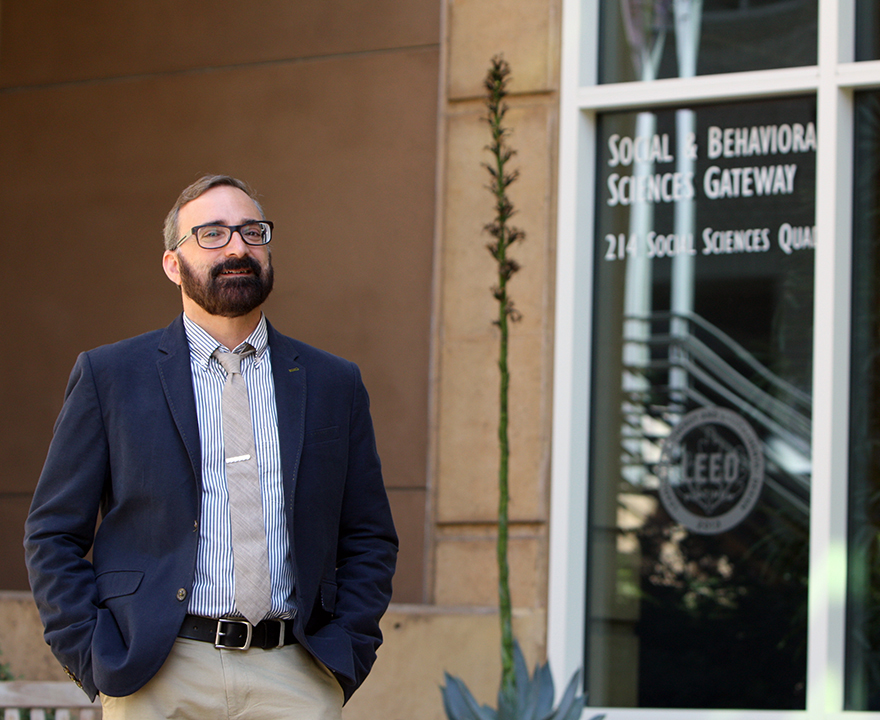A 20-year reflection and a look forward at social and behavioral science in the new century

A 20-year reflection and a look forward at social and behavioral science in the new century
- October 10, 2017
- Soc sci dean Maurer to MC research sponsors’ panel at 20th anniversary meeting of National Academy of Sciences Board on Behavioral, Cognitive and Sensory Sciences
-----
Twenty years ago, the National Academies of Sciences, Engineering and Medicine created the Board on Behavioral, Cognitive and Sensory Sciences – a community of top scholars who serve as an interdisciplinary resource to the policy-making community, bringing insights from the behavioral sciences on everything from military accessioning to how children learn. As part of the board’s biannual meeting and in honor of its two decades of service, the group will convene October 19 at the historic National Academy of Sciences building in Washington, DC. UCI social sciences dean and anthropology and law professor Bill Maurer will MC one of the featured panels, a conversation with federal agencies and research organizations that fund research, alongside panels featuring distinguished leading scholars and emerging talent from the scientific community on the importance and future of the behavioral sciences. The theme is “the limitless future” for the behavioral sciences—a future that will be marked by rapid social, environmental, and digital transformation, says Maurer.
“It’s really quite exciting to participate in a forum to showcase the very best research—from rewiring the brain to the human-technology interface and the role of the behavioral sciences in life, liberty and the pursuit of happiness, as we’ve titled the concluding panel. The conversation with funding agencies provides an opportunity to reflect on how federal research budgets can anticipate the future and where our fields will be 5, 10, 20 years out to meet emerging challenges,” says Maurer.
The meeting will conclude with a fireside chat between New York Times columnist David Brooks, Professor Daniel Gilbert of Harvard, and Marcia McNutt, President, National Academy of Sciences.
Maurer was appointed dean of UCI’s largest academic unit in 2013. He is director of the Institute for Money, Technology and Financial Inclusion, funded by the Bill and Melinda Gates Foundation, which supports research in over 40 countries on how new technologies of payment impact poor people’s existing financial wellbeing. In 2016, he was named a fellow of the American Association for the Advancement of Science.
A cultural anthropologist, Maurer conducts research on the technological infrastructures, material cultures, and social relations of exchange and payment, from cowrie shells to credit cards and mobile phones. His most recent NSF-supported research looks at how new computational architectures like those inspired by the cryptocurrency Bitcoin have the potential to automate aspects of legal practice and the social implications of computational law.
His research has been supported by several grants from the National Science Foundation, Russell Sage Foundation, and other agencies. He is the author or editor of ten books, including most recently, Paid: Tales of Dongles, Checks, and Other Money Stuff (MIT Press, with Lana Swartz). He was the William S. Wyse Visiting Professor of Anthropology at Cambridge in 2013. The past-president of the Association for Political and Legal Anthropology, he has served on numerous editorial boards including American Anthropologist, Cultural Anthropology, and PoLAR: The Political and Legal Anthropology Review. He is currently associate editor of the Journal of Cultural Economy.
He has also been involved in curatorial work associated with his research, including at the British Museum’s Citi Money Gallery and a collaboration with the Smithsonian. He continues to advise policy makers, philanthropic organizations and industry on new technologies of money and payment and their social and behavioral inputs and effects.
Maurer received his B.A. from Vassar College and his M.A. and Ph.D. from Stanford University.
-----
Would you like to get more involved with the social sciences? Email us at communications@socsci.uci.edu to connect.
Share on:
Related News Items
- Careet RightThree UC Irvine professors named co-editors of prestigious Law & Society Review
- Careet RightWhy some payments companies want to be banks
- Careet RightFormer NYC mayor Eric Adams accused of crypto scam shortly after leaving office
- Careet RightThe penny stops here: As 200-year-old coin ends its run, retailers face costly shift without clear rules
- Careet RightBanks plead for federal guidance as penny shortage spreads


